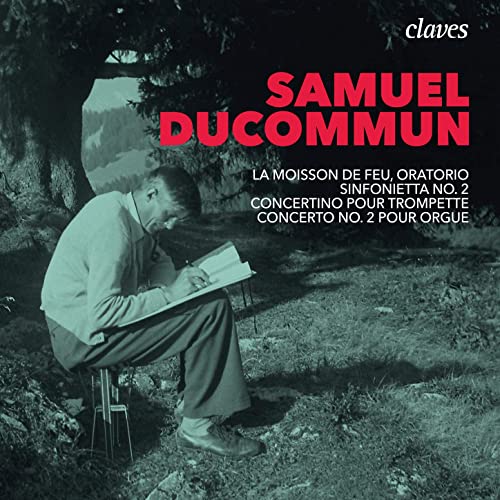
ESSENTIAL RECORDINGS

La Moisson de Feu - Oratorio for soloists, chorus, children's choir, orchestra and organ (inspired by the Apocalypse) Sinfonietta No. 2, opus 91 for string orchestra Concertino opus 68 for trumpet and orchestra Concerto No. 2, opus 102 for organ and string orchestra
It's hard to believe that after the many years of my life spent working in classical music retail and the thousands of recordings I've listened to that I still come across composers whose music I had never heard before. Swiss composer Samuel Ducommun (1914-1987) is the latest example, and what a pleasant revelation it is. First and foremost an organist and an ardent devotee of Marcel Dupré, most of his output was dedicated to the instrument, but other instrumental pieces and works for soloists, choir and orchestra were composed for particular occasions, as well as plenty of chamber music works for a wide range of instrumental groupings. The booklet notes further denote: "The style and spirit of his compositions are of French inspiration, their architecture often calling upon classical forms (fugue, passacaglia, sonata form, for example). Loyal to tonal music, sometimes of modal expression, Samuel Ducommun employs polytonality or even atonality without any preconceived theory. He has managed to find his own personal musical language, which neither wants to imitate anyone nor deny his origins."
La Moisson de Feu (Harvest of Fire) is the main work on this recording, and is based on poems inspired by the apocalypse. It's a highly dramatic oratorio full of dense orchestral textures and powerful choral passages. It very much reminds me of Havergal Brian's Gothic Symphony, but is more tightly knit and less meandering than Brian's music. The balance between the organ, orchestra and voices is wisely controlled, and the momentus subject matter always lurks within the music's development, with moments of great fear and/or delirium and rapture. The final movement in particular (The Eternal Return) is quite uplifting.
Plaudits to the executives of the independent Claves label for undertaking a recording of such a large scale production, and for their efforts to make Samuel Ducommun a more common (pun intended) name within classical discography.
Jean-Yves Duperron - November 2020